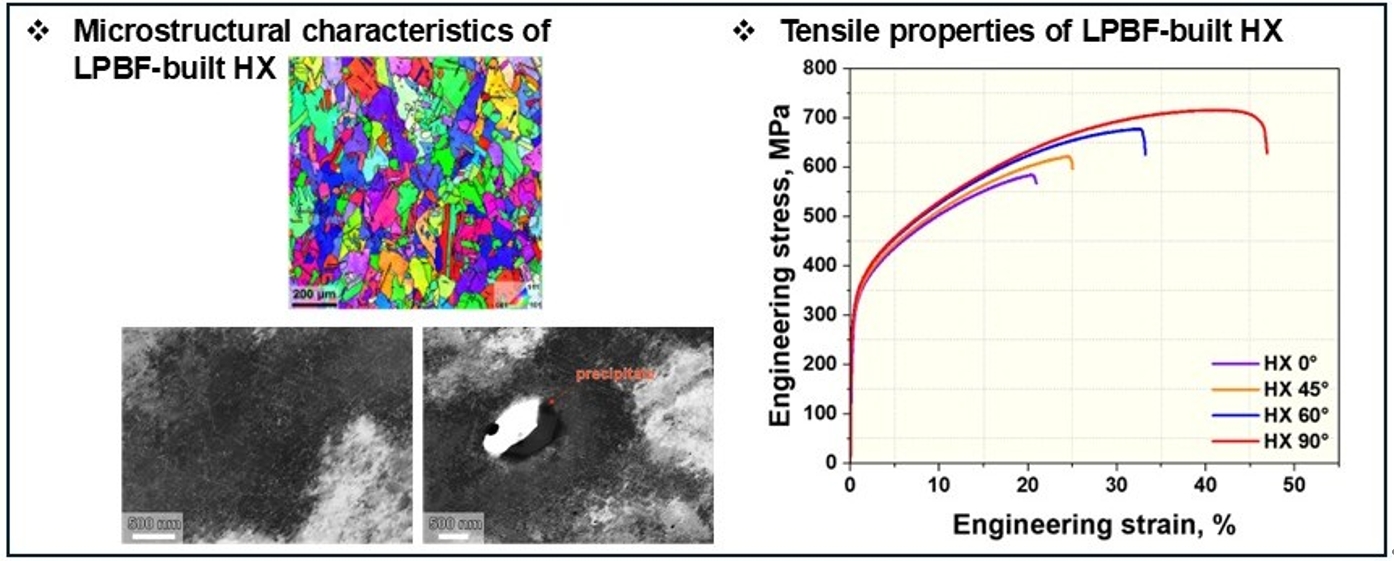- [Korean]
- Effect of Building Orientation on Tensile Properties of Hastelloy X alloy Manufactured by Laser Powder Bed Fusion
-
Seong-June Youn, GooWon Noh, Seok Su Sohn, Young-Sang Na, Young-Kyun Kim
-
J Powder Mater. 2025;32(2):131-137. Published online April 30, 2025
-
DOI: https://doi.org/10.4150/jpm.2025.00080
-
-
 Abstract Abstract
 PDF PDF
- In this study, the effect of build orientation on the mechanical properties of Hastelloy X fabricated by laser powder bed fusion (LPBF) process was investigated. Initial microstructural analysis revealed an equiaxed grain structure with random crystallographic orientation and annealing twins. Intragranular precipitates identified as Cr-rich M23C6 and Mo-rich M6C carbides were observed, along with a dense dislocation network and localized dislocation accumulation around the carbides. Mechanical testing showed negligible variation in yield strength with respect to build orientation; however, both ultimate tensile strength and elongation exhibited a clear increasing trend with higher build angles. Notably, the specimen built at 90° exhibited approximately 22% higher tensile strength and more than twice the elongation compared to the 0° specimen.
- [English]
- Effects of Precipitates and Oxide Dispersion on the High-temperature Mechanical Properties of ODS Ni-Based Superalloys
-
GooWon Noh, Young Do Kim, Kee-Ahn Lee, Hwi-Jun Kim
-
J Korean Powder Metall Inst. 2020;27(1):8-13. Published online February 1, 2020
-
DOI: https://doi.org/10.4150/KPMI.2020.27.1.8
-
-
1,854
View
-
36
Download
-
2
Citations
-
 Abstract Abstract
 PDF PDF
In this study, we investigated the effects of precipitates and oxide dispersoids on the high-temperature mechanical properties of oxide dispersion-strengthened (ODS) Ni-based super alloys. Two ODS Ni-based super alloy rods with different chemical compositions were fabricated by high-energy milling and hot extrusion process at 1150 °C to investigate the effects of precipitates on high-temperature mechanical properties. Further, the MA6000N alloy is an improvement over the commercial MA6000 alloy, and the KS6000 alloy has the same chemical composition as the MA6000 alloy. The phase and microstructure of Ni-based super alloys were investigated by X-ray diffraction and scanning electron microscopy. It was found that MC carbide precipitates and oxide dispersoids in the ODS Ni-based super alloys developed in this study may effectively improve high-temperature hardness and creep resistance. -
Citations
Citations to this article as recorded by  - Mechanical Properties and Residual Stress Analysis of ODS Ni Superalloy Fabricated by Laser Powder Bed Fusion Process
Dong Wan Lee, Su Gwan Lee, Cong Dhin Van, Cae Ryeong Kim, Jin Chun Kim, Hwi Jun Kim, Joong Gyeong Lim, Tae Sik Yoon
Journal of the Japan Society of Powder and Powder Metallurgy.2025; 72(Supplement): S453. CrossRef - Additive manufacturing of oxide-dispersion strengthened alloys: Materials, synthesis and manufacturing
Markus B. Wilms, Silja-Katharina Rittinghaus, Mareen Goßling, Bilal Gökce
Progress in Materials Science.2023; 133: 101049. CrossRef
|



